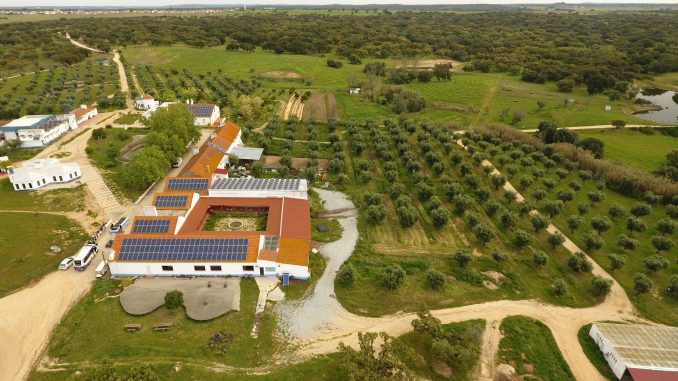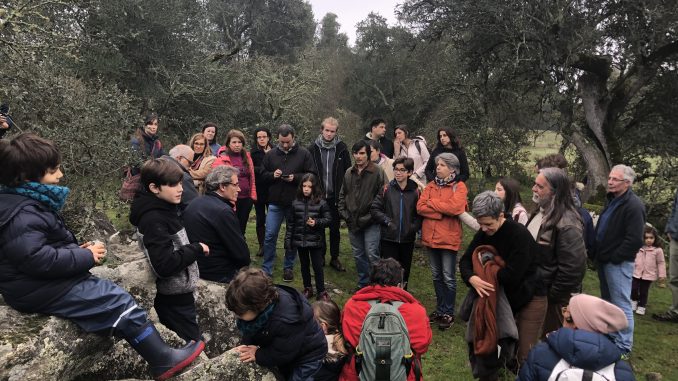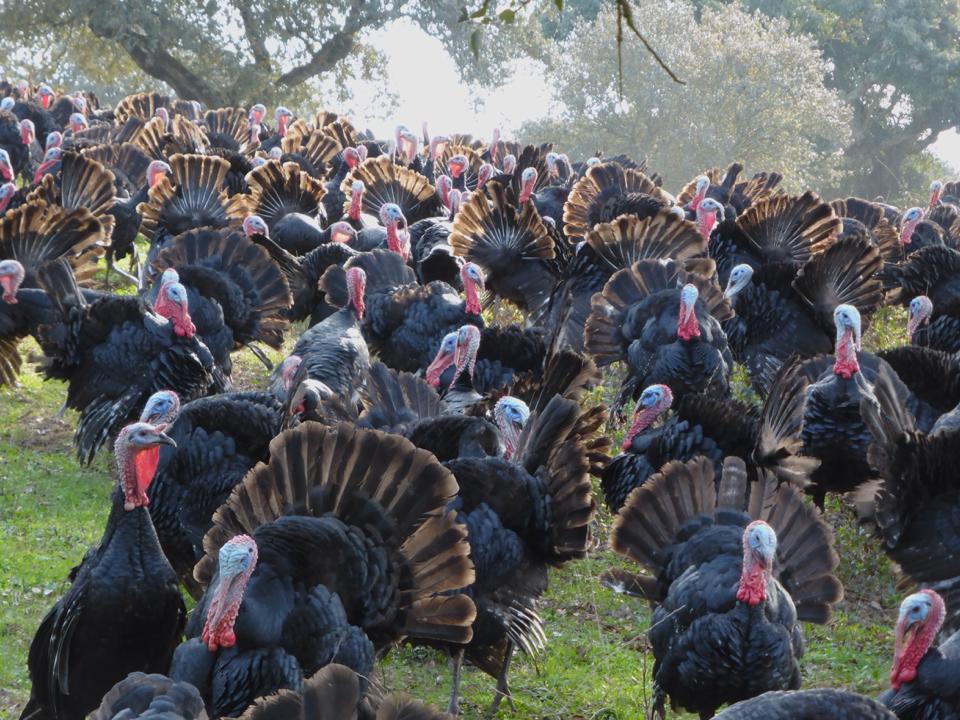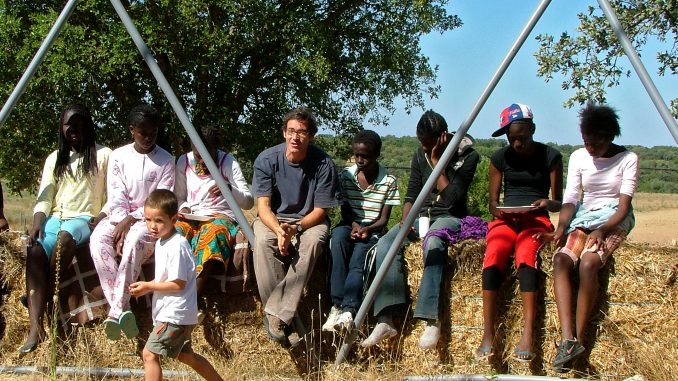Ed. note: This article first appeared on ARC2020.eu. ARC2020 is a platform for agri-food and rural actors working towards better food, farming, and rural policies for Europe.
Welcome to Herdade do Freixo do Meio, a 600-hectare community farm in Alentejo, Portugal. Run by a cooperative, the farm prides itself on agroecological food production that is local, responsible and conscious. It’s an experiment in sociocracy, and so the Letters from the Farm will be written collectively, with different members of the cooperative taking turns to pick up the pen.
This first letter is by Alfredo Sendim, who inherited the farm from his mother. Alfredo explains how the farm is building resilience through a collective approach, reconnecting with ecosystems and community. It’s a model of cooperation with nature inspired by the ancient agroforestry system of “montado”.
By Alfredo Sendim / Herdade Do Freixo Do Meio
Hello, I’m Alfredo, a farmer from this planet, Earth, Gaia to me. I grew up by the sea, far away from my family farm, Freixo do Meio, due to the revolution in Portugal. But in 1990 I started to help my mother, a social worker who resumed responsibility for our family estates when the government decided to return to us the ownership of the land.

The 600-hectare agroecological farm is inspired by the ancient agroforestry system of “montado”
Cooperation with nature
For more than thirty years I’ve been asking myself, what does “being a farmer” mean to me? How should I interact with the space? Rejecting dogmas, the results of the anthropocentric attitude, pushed me a long time ago to the hypothesis that I am just one element of a macroorganism called Gaia.
Since then, I have been experimenting with deep agroecology in the Herdade do Freixo do Meio farm where I live, trying a model of true cooperation with nature, based on the ancient agroforestry system of “montado” (cork tree landscape).
More and more, the Project of Nature is my daily inspiration, which I seek to serve in co-creation with all wild and domestic beings. I want to live in a world based on peaceful, cooperative, self-resilient, communities. I’m looking for the “Allowed Fruit” as opposed to the classic “Forbidden Fruit”.
The universe of multifunctionality and biodiversity in the ancestral forest of oaks around me is a fertile field of personal and spiritual growth that showed me the evidence that you should not be a farmer alone. That’s probably only a human concept. We are, of course, all connected.

Food community: co-producers (consumers) are invited to take an active role in their food chain
Sharing the harvest
Since 2015, I have been experiencing a Community Supported Agriculture Program, “CSA Sharing the Harvest”, on my farm. It’s a food community, currently made up of 180 families and 7 farmers, organized in a model of consumption. Agroecological food production, local, responsible and conscious.
For periods of six months, these co-producers (consumers) use on a weekly basis and at fixed prices, production shares for organic food (fruits, vegetables, bread, eggs, meat, olive oil, soup, cheese, milk…) and make a commitment to us to share the benefits and risks associated with food production.
It’s easier for me to plan the harvest, it allows a more rational food distribution circuit, a decent and stable income, but also helps to prevent and reduce food waste.
Co-producers receive fresh seasonal organic foods, support local consumption and are invited to participate in the harvests and to take an active role in their food chain (eg in quarterly meetings).
With this voluntary subscription, the families that support this project connect to Montado do Freixo do Meio, support local development and ancestral know-how, contribute to the preservation of environmental services, reconnect with ecosystems and support adaptation to climate change.
Through this informed food choice, co-producers contribute to the creation of a more truthful food system, reinforce values of solidarity and trust and participate in the construction of a landscape for the future.

Food abundance in cooperation with nature: the Users Cooperative produces and shares more than 300 organic food items, including black turkeys raised in the open air.
Users Cooperative
The next step was the Freixo do Meio Users Cooperative, an integral consumption coop I founded in January 2018, based on the community that participates in the agroecological CSA project (employees, consumers, inhabitants, farmers, neighbours and other users).
In a non-profit model of collaboration and collective participation, sociocracy tools were implemented, to increase the participation of all.
That’s why these will be collective letters.
Related to the agroecological model we adopted, we work hard to ensure that the functions of each element of biodiversity are absolutely respected, guaranteeing cyclicality, energy stability and the self-regulation mechanisms of the ecosystems.
The Freixo do Meio Users Coop carried on the practices of sustainable agriculture implemented in the nineties: without soil mobilization, respecting its microbiome, self-sufficient, and without external inputs. The soils are enriched with the incorporation of biomass and organic matter in a closed fertility circuit.
The goal is to make all the pieces of the agricultural mosaic come together in balance and proportion and contribute to the nutrition of plants, which includes the functionality of animals in ecosystems, the composting of the organic fraction of our processing units, the green manure of the land with integration of legumes and nitrogen fixation and the incorporation of shavings or chips resulting from tree pruning, forest thinning actions or agricultural probes.
In addition to all the sustainability measures, the farm preserves several native breeds such as the Alentejo pig, Merino Black sheep, Lusitanian black chicken, Sorraia horse, and Barrosã cow.
The Coop produces and shares more than 300 organic food items, like acorn food products, Alentejo black pork meat, Barrosã beef, black turkeys raised in the open air, vegetables and diverse fruits, olive oil, Portuguese grape varieties, and edible wild foods (aromatic and medicinal herbs, wild mushrooms). This endogenous use of food resources spotlights the idea that it is possible to have food abundance in cooperation with nature.

“I dream that one day all farmers of this planet will be really connected to the ecosystems they belong to, and to the social communities around them”
Resilience
Freixo do Meio is actually a 600-hectare estate in Alentejo. In the current context of climate change, compared to other regions of Europe, we know that in the future Alentejo will be challenged by extreme climatic events. This makes us focus hard on resilience measures that can be implemented in the context of adaptation to climate change.
I will give you some examples of actions that have been implemented here in Freixo do Meio:
- Efficient use of rainwater, through small retention basins and widespread use of drip irrigation.
- Diversification of crops and planting of perennial, fruit and legume trees in dynamic succession agroforestry systems with the aim of increasing biodiversity, food abundance and several niches on the farm.
- Organic fertilization of crops using beneficial microorganisms.
- Use of renewable energy. Herdade do Freixo do Meio Solar Village, 2017. 50% self-sufficient in energy. 288 photovoltaic modules, 500m2 roof. Prevent 59 tons CO2 emissions.
- Continuous work to increase organic matter of the soil, promoting water retention.
- Implementation of ecosystem restoration techniques developed from the concepts of permaculture and agroecology, namely the Keyline system (with the scientific support of projects such as Ecomontado XXI).
To end, I want to share with you the real sense of resilience we all felt in common, facing the pandemic crisis.
By adopting a collective strategy five years ago, the ecosystem, farmers and consumers were able to breed, work and eat, with a clear commitment.
I dream that one day all farmers of this planet will be really connected to the ecosystems they belong to, and to the social communities around them. Inshallah.





